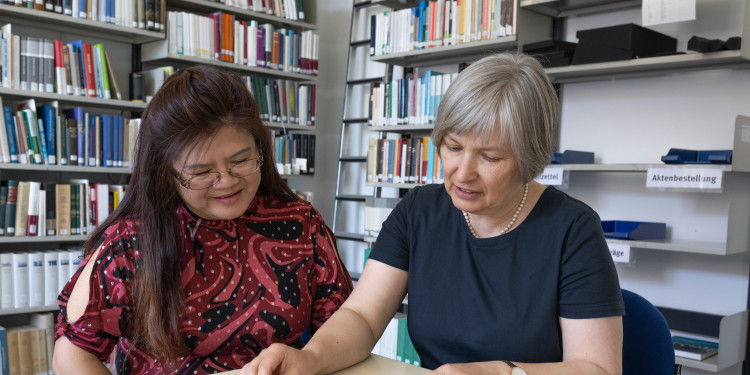
Researching genealogy at the other end of the world
She didn’t expect to be holding so many documents in her hands after enquiring in the Münster University Archive, says Dong-Nan Zhu. She is visibly delighted – and a bit excited too – as, together with her husband and daughter, she looks over the 22 pages which Dr. Sabine Happ, who heads up the Archive, has searched out for her. These pages are emotionally and historically significant for the 50-year-old Dong-Nan Zhu. The blue personnel file card – with “Reichsministerium für Wissenschaft, Erziehung und Volksbildung” (“Ministry of Science and National Education”) in black Gothic lettering on it – belonged to her grandmother Fu-Ying Liu, who wrote her doctorate between 1937 and 1939 at the Institute of Pharmacy and Chemical Technology in Münster. Around 80 years later, her granddaughter travels over 9,000 kilometres to Münster with her family, and in the University Archive she gets to see the certificates, testimonials and other documents relating to her grandmother. “It was a delightful as well as an extraordinary enquiry,” says Sabine Happ.
Although genealogical research is nothing unusual for the Archive’s staff, says Happ, “I can’t remember ever getting an enquiry from China.” Particularly as the grandmother’s university career was rather special. In June 1936, Fu-Ying Liu completed her bachelor’s course in Chemistry at Zhejiang University in Hangzhou. After an interim stop at the Technische Universität in Berlin, where she learned German up to an almost perfect level in just one year, Fu-Ying Liu, then 24 years old, transferred to Münster for the winter semester 1937/38 in order to write her PhD. “Given the image of women that was propagated at the time, and the limited advancement opportunities for foreign women in research during the Nazi period, such careers were a real rarity,” says Sabine Happ. German universities were not a popular destination for foreign students at that time. Data from the University Archive show that the proportion of foreigners among the students in the early 1930s was below half of one percent.
Fu-Ying Liu’s brother played an important role in her decision to go to Germany nonetheless and write her PhD there, says her granddaughter as she browses through her grandmother’s documents. “Even at that time he was advocating equal educational opportunities for women and men,” says Dong-Nan Zhu. “If it hadn’t been for him, she might never have had the chance to study at university.” Fu-Ying Liu and her siblings had to fend for themselves at an early age after their mother died when Fu-Ying Liu was just four years old.

In response to the question of how her enquiry in the University Archive went, Dong-Nan Zhu reacts with a laugh. At the beginning she couldn’t see the wood for the trees, she says. “There are so many different departments at the University that I didn’t know who to ask. So I tried the Alumni Club, and they passed on my enquiry to the Department of Chemistry and Pharmacy. Nor could anyone help her there, either – so her enquiry ended up with Sabine Happ in the University Archive. Happ trawled through student cards and the database for personnel and examination files – and quickly came up trumps. As a rule, the team sends out a digital copy of the documents, but Fu-Ying Liu’s interesting academic career sparked Happ’s interest and she contacted Dong-Nan Zhu, who is Chinese by birth and lives in California. When the latter learned that it was possible to visit the Archive, she booked the long flight across the Atlantic in order to get to know the place where her grandmother had lived and worked and to browse through the documents with Sabine Happ.
Although Dong-Nan Zhu sometimes talked with her grandmother about the time in Münster before the latter died in 2001, she learned a lot more about her academic career and her dissertation project. “She had a fascinating life – it could have been turned into a film,” she says after looking through the documents. Of course, every film needs a love story – and the time spent in Münster was a great success not only in a scientific respect. In August 1939, shortly before she returned to China, Fu-Ying Liu married her husband – Dong-Nan Zhu’s grandfather.
Author: Linus Peikenkamp
